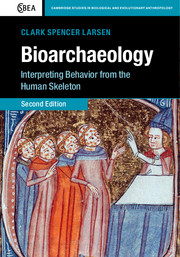Book contents
- Frontmatter
- Dedication
- Contents
- Preface to the Second Edition
- Preface to the First Edition
- 1 Introduction
- 2 Stress and deprivation during growth and development and adulthood
- 3 Exposure to infectious pathogens
- 4 Injury and violence
- 5 Activity patterns: 1. Articular degenerative conditions and musculoskeletal modifications
- 6 Activity patterns: 2. Structural adaptation
- 7 Masticatory and nonmasticatory functions: craniofacial adaptation to mechanical loading
- 8 Isotopic and elemental signatures of diet, nutrition, and life history
- 9 Biological distance and historical dimensions of skeletal variation
- 10 Bioarchaeological paleodemography: interpreting age-at-death structures
- 11 Bioarchaeology: skeletons in context
- References
- Index
- Plate section
Preface to the First Edition
Published online by Cambridge University Press: 05 April 2015
- Frontmatter
- Dedication
- Contents
- Preface to the Second Edition
- Preface to the First Edition
- 1 Introduction
- 2 Stress and deprivation during growth and development and adulthood
- 3 Exposure to infectious pathogens
- 4 Injury and violence
- 5 Activity patterns: 1. Articular degenerative conditions and musculoskeletal modifications
- 6 Activity patterns: 2. Structural adaptation
- 7 Masticatory and nonmasticatory functions: craniofacial adaptation to mechanical loading
- 8 Isotopic and elemental signatures of diet, nutrition, and life history
- 9 Biological distance and historical dimensions of skeletal variation
- 10 Bioarchaeological paleodemography: interpreting age-at-death structures
- 11 Bioarchaeology: skeletons in context
- References
- Index
- Plate section
Summary
The writing of this book was fostered by my involvement in a series of interdisciplinary research programs undertaken in the southeastern (Florida and Georgia) and western (Nevada) United States. I thank my collaborators, colleagues, and friends who have been involved in this exciting research. With regard to fieldwork, the following individuals and projects figured prominently in the development of this book: David Hurst Thomas on St. Catherines Island, Georgia; Jerald Milanich and Rebecca Saunders on Amelia Island, Florida; Bonnie McEwan at Mission San Luis de Talimali in Tallahassee, Florida; and Robert Kelly in the western Great Basin, Nevada. A number of individuals deserve special thanks for their valuable contributions to the study of human remains from these regions: Christopher Ruff, Margaret Schoeninger, Dale Hutchinson, Katherine Russell, Scott Simpson, Anne Fresia, Nikolaas van der Merwe, Julia Lee-Thorp, Mark Teaford, David Smith, Inui Choi, Mark Griffin, Katherine Moore, Dawn Harn, Rebecca Shavit, Joanna Lambert, Susan Simmons, Leslie Sering, Hong Huynh, Elizabeth Moore, and Elizabeth Monahan.
I thank the Edward John Noble Foundation, the St. Catherines Island Foundation, Dr. and Mrs. George Dorion, the Center for Early Contact Period Studies (University of Florida), the National Science Foundation (awards BNS-8406773, BNS-8703849, BNS-8747309, SBR-9305391, SBR-9542559), and the National Endowment for the Humanities (award RK-20111-94) for support of fieldwork and follow-up analysis. Research leave given to me during the fall of 1991 while I was on the faculty at Purdue University and a fellowship from Purdue’s Center for Social and Behavioral Sciences during the spring and summer of 1992 gave me a much needed breather from teaching and other obligations in order to get a jump-start on writing this book. Preparation of the final manuscript was made possible by generous funding from the University of North Carolina’s University Research Council. I acknowledge the support – institutional and otherwise – of the University of North Carolina’s Research Laboratories of Anthropology, Vincas Steponaitis, Director.
- Type
- Chapter
- Information
- BioarchaeologyInterpreting Behavior from the Human Skeleton, pp. xv - xviPublisher: Cambridge University PressPrint publication year: 2015



